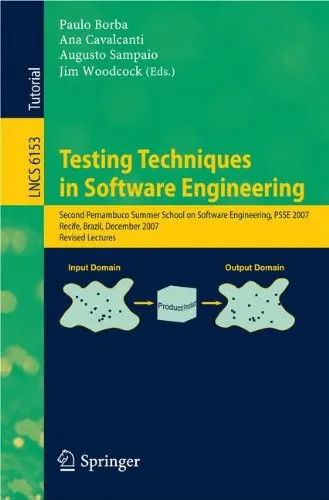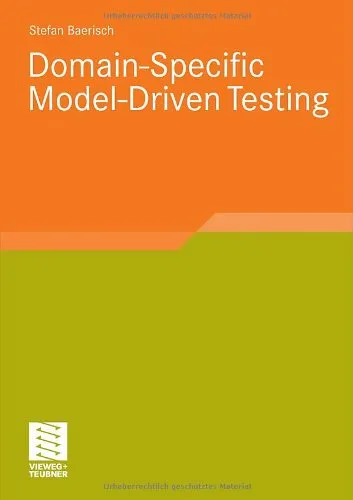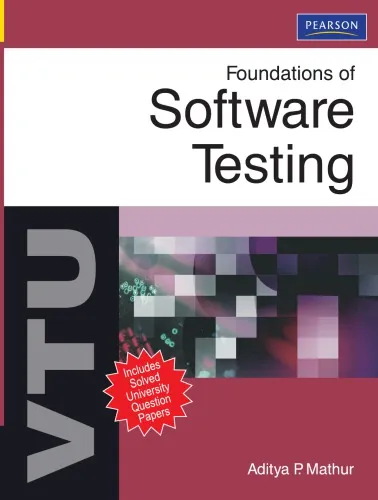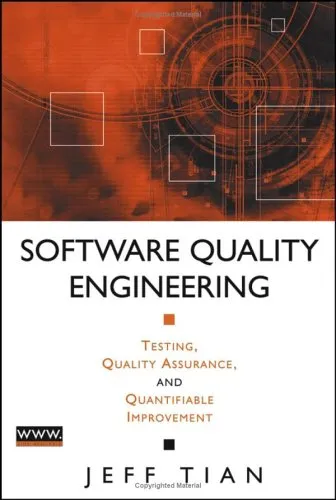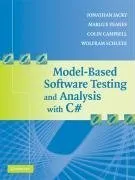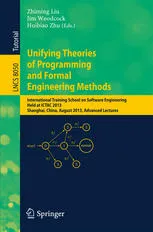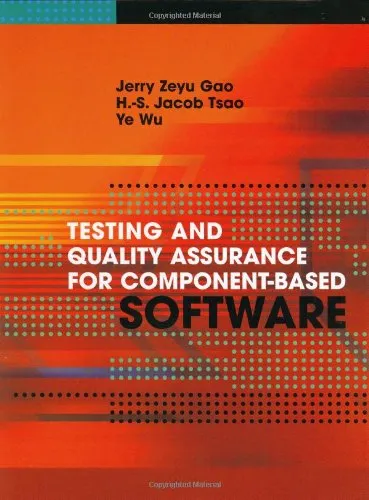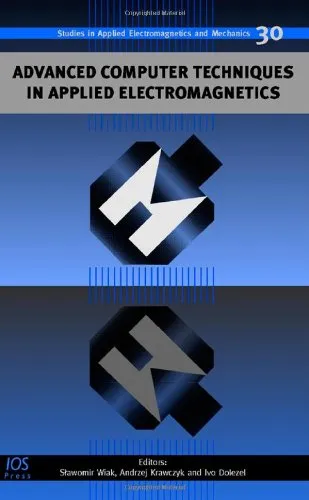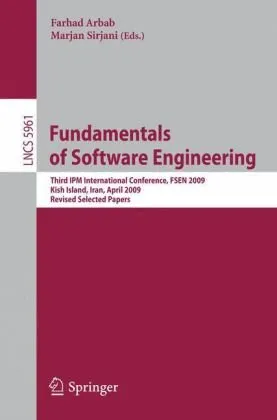Testing Techniques in Software Engineering: Second Pernambuco Summer School on Software Engineering, PSSE 2007, Recife, Brazil, December 3-7, 2007, Revised Lectures
4.4
بر اساس نظر کاربران

شما میتونید سوالاتتون در باره کتاب رو از هوش مصنوعیش بعد از ورود بپرسید
هر دانلود یا پرسش از هوش مصنوعی 2 امتیاز لازم دارد، برای بدست آوردن امتیاز رایگان، به صفحه ی راهنمای امتیازات سر بزنید و یک سری کار ارزشمند انجام بدینکتاب های مرتبط:
معرفی کتاب
کتاب Testing Techniques in Software Engineering مجموعهای از سخنرانیهای بازبینیشده از دومین مدرسه تابستانی مهندسی نرمافزار پرنامبوکو (PSSE 2007) است که در دسامبر 2007 در رسیف، برزیل برگزار شد. این کتاب به عنوان یک منبع مهم برای توسعهدهندگان نرمافزار، پژوهشگران و دانشجویانی که به تست نرمافزار علاقهمند هستند، مطرح میشود.
خلاصهای از کتاب
این کتاب شامل مجموعهای از روشها و تکنیکهای تست نرمافزار است که توسط متخصصین و پژوهشگران برجسته این حوزه ارائه شده است. هر فصل از کتاب به یک موضوع خاص در زمینه تست نرمافزار میپردازد و نتایج تحقیقات و تجربیات عملی را به اشتراک میگذارد. از موضوعات مهم مطرحشده میتوان به testing-driven development، آزمونهای خودکار و بررسی کارآیی سیستمها اشاره کرد. این تکنیکها به منظور بهبود کیفیت نرمافزار و کاهش خطاهای برنامهنویسی بررسی شدهاند.
نکات کلیدی
- درک عمیقتری از روشهای test case generation و اهمیت آنها در توسعه نرمافزار.
- بررسی فرآیندهای خودکارسازی تست و تأثیر آن بر سرعت و دقت در فرآیند توسعه.
- یافتن رویکردهای نوین برای اطمینان از کیفیت و قابلیت اطمینان نرمافزار.
- شناسایی ابزار و چارچوبهای جدید برای آزمون نرمافزار.
جملات مشهوری از کتاب
"Quality is not an act, it is a habit. The same holds true for software testing."
"Automated testing is a cornerstone of modern software development."
اهمیت این کتاب
این کتاب در آموزش و فهم عمیقتر تکنیکهای تست نرمافزار از اهمیت ویژهای برخوردار است. با مطالعه این کتاب، توسعهدهندگان میتوانند بهبود چشمگیری در کیفیت کد و بهرهوری زمان داشته باشند و در نتیجه محصولات نرمافزاری با کیفیتتری ارائه دهند. این کتاب بهویژه برای کسانی که در صدد بهینهسازی فرآیندهای توسعه نرمافزار در سازمان خود هستند بسیار مفید خواهد بود.
Introduction
Welcome to "Testing Techniques in Software Engineering," a comprehensive compilation of revised lectures from the Second Pernambuco Summer School on Software Engineering (PSSE 2007) held in the vibrant city of Recife, Brazil. This pivotal event brought together some of the leading minds in software engineering to delve into the depths of software testing—a field crucial for delivering robust, reliable software systems in today's technology-driven world.
Testing is an integral stage of the software development lifecycle, ensuring that software systems function correctly and meet user requirements. As software becomes more complex, evolving with rapid technological advancements, it is imperative to adopt efficient testing techniques that can cope with these changes. Hosted by preeminent scholars Paulo Borba, Ana Cavalcanti, Augusto Sampaio, and Jim Woodcock, this book not only encapsulates the intellectual essence of the Summer School but also serves as a seminal reference for both aspiring and experienced software engineers looking to refine their testing methodologies and strategies.
Detailed Summary
The book is structured into a series of chapters, each contributed by experts in the field, focusing on a variety of testing techniques and their applications. Topics range from fundamental concepts to advanced, cutting-edge methods in software testing, offering readers insights into both the theoretical and practical aspects of the subject.
Among the key themes covered are model-based testing, test case generation, formal verification, and the role of testing in extreme programming and agile processes. Each chapter is designed to provide readers with a deep understanding of how these techniques can be applied in real-world scenarios to improve software quality.
The combination of academic research and practical applications presented in this book makes it an indispensable resource for anyone interested in mastering the art and science of software testing.
Key Takeaways
- Comprehensive coverage of various testing techniques in the context of modern software engineering practices.
- Insights on integrating testing with agile methodologies, emphasizing adaptability and efficiency.
- Practical examples and case studies that illustrate the implementation of testing strategies in real-life projects.
- Discussions on the future trends in software testing and its evolving role in ensuring software quality.
Famous Quotes from the Book
“Testing is not just about finding bugs, but about understanding the software.”
“The value of a test is not in what it finds, but in what it prevents from going wrong.”
Why This Book Matters
"Testing Techniques in Software Engineering" is a cornerstone reference that captures the evolving landscape of software testing. It fills a critical gap between classic testing theories and the demands of contemporary software development environments, which are characterized by rapid changes and ever-increasing quality requirements.
The book is particularly significant because it brings together diverse perspectives from academia and industry, providing readers with a holistic view of the challenges and opportunities that software testing presents. It serves as both an educational text and a practical guide, making it an important resource for academics, students, and professionals eager to stay abreast of the latest advancements in this essential field.
In an era where software reliability and performance are paramount, understanding and implementing effective testing strategies can make a significant difference. This book equips its readers with the knowledge and skills necessary to achieve excellence in software testing, thereby contributing to the broader goal of advancing software engineering as a discipline.
دانلود رایگان مستقیم
شما میتونید سوالاتتون در باره کتاب رو از هوش مصنوعیش بعد از ورود بپرسید
دسترسی به کتابها از طریق پلتفرمهای قانونی و کتابخانههای عمومی نه تنها از حقوق نویسندگان و ناشران حمایت میکند، بلکه به پایداری فرهنگ کتابخوانی نیز کمک میرساند. پیش از دانلود، لحظهای به بررسی این گزینهها فکر کنید.
این کتاب رو در پلتفرم های دیگه ببینید
WorldCat به شما کمک میکنه تا کتاب ها رو در کتابخانه های سراسر دنیا پیدا کنید
امتیازها، نظرات تخصصی و صحبت ها درباره کتاب را در Goodreads ببینید
کتابهای کمیاب یا دست دوم را در AbeBooks پیدا کنید و بخرید
1190
بازدید4.4
امتیاز0
نظر98%
رضایتنظرات:
4.4
بر اساس 0 نظر کاربران
Questions & Answers
Ask questions about this book or help others by answering
No questions yet. Be the first to ask!
